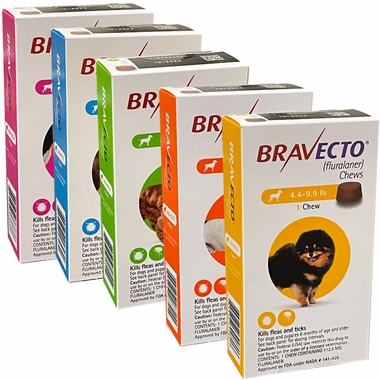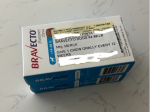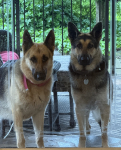SAVE 20% OFF 20% OFF Use Code PREZ20 *
Bravecto Chews for Dogs
- Notice
- Description
- Ingredients
- Directions
- FAQ
- Reviews
Notices
This is our Rock-Bottom-Price! Sorry, Promotional offers do not apply (See Exclusions.)
Description
Bravecto Chew for Dogs is an innovative flea and tick treatment designed to keep your canine companion protected from pesky parasites. This chewable tablet offers long-lasting defense against fleas and ticks, ensuring your dog stays healthy and happy. With just one chew, Bravecto provides up to 12 weeks of continuous protection, making it a convenient and reliable solution for pet owners.
The active ingredient in Bravecto, fluralaner, works quickly to kill fleas and ticks upon contact, effectively breaking the flea life cycle and preventing reinfestation. Whether your dog loves exploring the great outdoors or lounging at home, Bravecto Chew offers peace of mind by safeguarding against a variety of tick species, including black-legged ticks, American dog ticks, and brown dog ticks.
Bravecto Chew is suitable for dogs of all sizes, starting from 4.4 pounds, and is available in multiple weight-based formulations for easy dosing. Say goodbye to the hassle of monthly treatments and hello to long-lasting protection with Bravecto Chew for Dogs.
Key Features:
- Long-lasting protection: Provides up to 12 weeks of continuous flea and tick protection with just one chew.
- Fast-acting formula: Starts killing fleas within 2 hours and ticks within 12 hours, effectively breaking the flea life cycle.
- Broad-spectrum coverage: Guards against various tick species, including black-legged ticks, American dog ticks, and brown dog ticks.
- Convenient administration: Chewable tablet format makes it easy to administer without the mess or stress of topical treatments.
- Suitable for all sizes: Available in weight-based formulations for dogs weighing 4.4 pounds or more.
- Trusted efficacy: Recommended by veterinarians worldwide for its effectiveness in keeping dogs protected from fleas and ticks.
- Peace of mind: Provides pet owners with confidence and peace of mind knowing their furry friends are safeguarded against parasites.
How It Works:
After giving your dog Bravecto Chews, the medication quickly reaches tissue fluids under your dog's skin. When fleas and ticks feed on your dog, they ingest Bravecto and die. Bravecto Chews kills fleas, prevents flea infestations and kills ticks (black-legged tick (a.k.a. deer tick), American dog tick, and brown dog tick) for 12 weeks. Bravecto Chews also kills lone star ticks for 8 weeks.
Indications:
Bravecto kills adult fleas and is indicated for the treatment and prevention of flea infestations (Ctenocephalides felis) and the treatment and control of tick infestations [Ixodes scapularis (blacklegged tick), Dermacentor variabilis (American dog tick), and Rhipicephalus sanguineus (brown dog tick)] for 12 weeks in dogs and puppies 6 months of age and older, and weighing 4.4 pounds or greater.
Bravecto is also indicated for the treatment and control of Amblyomma americanum (lone star tick) infestations for 8 weeks in dogs and puppies 6 months of age and older, and weighing 4.4 pounds or greater.
Specifications:
- Generic Name: Fluralaner
- Usage: Prevention, Treatment
- Repels or Prevents: Fleas
- Kills or Treats: Fleas, Ticks
- Lifestage: Adult, Senior, Puppy
- Breed Size: Small Breeds
- Product Form: Chew
- Strength: 250 mg Fluralaner
Ingredients
| Bravecto Chews 4.4-9.9 lbs: | |
|---|---|
| Active Ingredient (per tablet) | Amount |
| Fluralaner | 112.5 mg |
| Bravecto Chews >9.9-22.0 lbs: | |
| Active Ingredient (per tablet) | Amount |
| Fluralaner | 250 mg |
| Bravecto Chews >22.0-44.0 lbs: | |
| Active Ingredient (per tablet) | Amount |
| Fluralaner | 500 mg |
| Bravecto Chews >44.0-88.0 lbs: | |
| Active Ingredient (per tablet) | Amount |
| Fluralaner | 1000 mg |
| Bravecto Chews >88.0-123.0 lbs: | |
| Active Ingredient (per tablet) | Amount |
| Fluralaner | 1,400 mg |
Directions
Bravecto should be administered orally as a single dose every 12 weeks according to the Dosage Schedulebelow to provide a minimum dose of 11.4 mg/lb (25 mg/kg) body weight.
Bravecto may be administered every 8 weeks in case of potential exposure to Amblyomma americanum ticks
Bravecto should be administered with food.
| Dosage Schedule | ||
|---|---|---|
| Body Weight Ranges (lb) | Fluralaner Content (mg) | Chews Administered |
| 4.4 - 9.9 | 112.5 | 1 (Yellow) |
| >9.9 - 22.0 | 250 | 1 (Orange) |
| >22.0 - 44.0 | 500 | 1 (Green) |
| >44.0 - 88.0 | 1000 | 1 (Blue) |
| >88.0 - 123.0* | 1400 | 1 (Purple) |
*Dogs over 123.0 lb should be administered the appropriate combination of chews

The potential risks ticks pose to pets can be stressful to pet owners wanting to ensure their pet receives effective coverage. Bravecto kills 4 different species of ticks commonly found on dogs and 2 species found on cats to protect your pet for 12 weeks.*5-7
PROTECT YOUR PET AGAINST THESE TICK SPECIES5-7

Contraindications:
There are no known contraindications for the use of the product.
Warnings:
Not for human use. Keep this and all drugs out of the reach of children. Keep the product in the original packaging until use, in order to prevent children from getting direct access to the product.
Do not eat, drink or smoke while handling the product. Wash hands thoroughly with soap and water immediately after use of the product.
Precautions:
Bravecto has not been shown to be effective for 12-weeks duration in puppies less than 6 months of age. Bravecto is not effective against Amblyomma americanum ticks beyond 8 weeks after dosing.
Adverse Reactions:
In a well-controlled U.S. field study, which included 294 dogs (224 dogs were administered Bravecto every 12 weeks and 70 dogs were administered an oral active control every 4 weeks and were provided with a tick collar); there were no serious adverse reactions. All potential adverse reactions were recorded in dogs treated with Bravecto over a 182-day period and in dogs treated with the active control over an 84-day period. The most frequently reported adverse reaction in dogs in the Bravecto and active control groups was vomiting.
| Percentage of Dogs with Adverse Reactions in the Field Study | ||
|---|---|---|
| Adverse Reaction (AR) | Bravecto Group: Percentage of Dogs with the AR During the 182-Day Study (n=224 dogs) | Active Control Group: Percentage of Dogs with the AR During the 84-Day Study (n=70 dogs) |
| Vomiting | 7.1 | 14.3 |
| Decreased Appetite | 6.7 | 0.0 |
| Diarrhea | 4.9 | 2.9 |
| Lethargy | 5.4 | 7.1 |
| Polydipsia | 1.8 | 4.3 |
| Flatulence | 1.3 | 0.0 |
In a well-controlled laboratory dose confirmation study, one dog developed edema and hyperemia of the upper lips within one hour of receiving Bravecto. The edema improved progressively through the day and had resolved without medical intervention by the next morning.
For technical assistance or to report a suspected adverse drug reaction, contact Merck Animal Health at 1-800-224-5318. Additional information can be found at www.bravecto.com. For additional information about adverse drug experience reporting for animal drugs, contact FDA at 1-888-FDA-VETS or online at http://www.fda.gov/AnimalVeterinary/SafetyHealth.
Clinical Pharmacology:
Peak fluralaner concentrations are achieved between 2 hours and 3 days following oral administration, and the elimination half-life ranges between 9.3 to 16.2 days. Quantifiable drug concentrations can be measured (lower than necessary for effectiveness) through 112 days. Due to reduced drug bioavailability in the fasted state, fluralaner should be administered with food.
Mode of Action:
Fluralaner is for systemic use and belongs to the class of isoxazoline-substituted benzamide derivatives. Fluralaner is an inhibitor of the arthropod nervous system. The mode of action of fluralaner is the antagonism of the ligand-gated chloride channels (gamma-aminobutyric acid (GABA)-receptor and glutamate-receptor).
Effectiveness:
Bravecto began to kill fleas within two hours after administration in a well-controlled laboratory study. In a European laboratory study, Bravecto killed fleas and Ixodes ricinus ticks and reduced the numbers of live fleas and Ixodes ricinus ticks on dogs by >98% within 12 hours for 12 weeks. In a well-controlled laboratory study, Bravecto demonstrated 100% effectiveness against adult fleas 48 hours post-infestation for 12 weeks. In well-controlled laboratory studies, Bravecto demonstrated ≥93% effectiveness against Dermacentor variabilis, Ixodes scapularis and Rhipicephalus sanguineus ticks 48 hours post-infestation for 12 weeks. Bravecto demonstrated ≥90% effectiveness against Amblyomma americanum 72 hours post-infestation for 8 weeks, but failed to demonstrate ≥90% effectiveness beyond 8 weeks.
In a well-controlled U.S. field study, a single dose of Bravecto reduced fleas by ≥99.7% for 12 weeks. Dogs with signs of flea allergy dermatitis showed improvement in erythema, alopecia, papules, scales, crusts, and excoriation as a direct result of eliminating flea infestations.
Palatability: In a well-controlled U.S. field study, which included 559 doses administered to 224 dogs, 80.7% of dogs voluntarily consumed Bravecto within 5 minutes, an additional 12.5% voluntarily consumed Bravecto within 5 minutes when offered with food, and 6.8% refused the dose or required forced administration.
Animal Safety:
Margin of Safety Study: In a margin of safety study, Bravecto was administered orally to 8 - to 9-week-old puppies at 1, 3, and 5X the maximum label dose of 56 mg/kg at three, 8-week intervals. The dogs in the control group (0X) were untreated.
There were no clinically-relevant, treatment-related effects on physical examinations, body weights, food consumption, clinical pathology (hematology, clinical chemistries, coagulation tests, and urinalysis), gross pathology, histopathology, or organ weights. Diarrhea, mucoid and bloody feces were the most common observations in this study, occurring at a similar incidence in the treated and control groups. Five of the twelve treated dogs that experienced one or more of these signs did so within 6 hours of the first dosing. One dog in the 3X treatment group was observed to be dull, inappetant, with evidence of bloody diarrhea, vomiting, and weight loss beginning five days after the first treatment. One dog in the 1X treatment group vomited food 4 hours following the first treatment.
Reproductive Safety Study: Bravecto was administered orally to intact, reproductively-sound male and female Beagles at a dose of up to 168 mg/kg (equivalent to 3X the maximum label dose) on three to four occasions at 8-week intervals. The dogs in the control group (0X) were untreated.
There were no clinically-relevant, treatment-related effects on the body weights, food consumption, reproductive performance, semen analysis, litter data, gross necropsy (adult dogs) or histopathology findings (adult dogs and puppies). One adult treated dog suffered a seizure during the course of the study (46 days after the second treatment). Abnormal salivation was observed on 17 occasions: in six treated dogs (11 occasions) after dosing and four control dogs (6 occasions).
The following abnormalities were noted in 7 pups from 2 of the 10 dams in only the treated group during gross necropsy examination: limb deformity (4 pups), enlarged heart (2 pups), enlarged spleen (3 pups), and cleft palate (2 pups). During veterinary examination at Week 7, two pups from the control group had inguinal testicles, and two and four pups from the treated group had inguinal and cryptorchid testicles, respectively. No undescended testicles were observed at the time of necropsy (days 50 to 71).
In a well-controlled field study Bravecto was used concurrently with other medications, such as vaccines, anthelmintics, antibiotics, and steroids. No adverse reactions were observed from the concurrent use of Bravecto with other medications.
Storage:
Do not store above 86°F (30°C).
FAQ
Bravecto has a wide margin of safety in dogs who weigh at least 4.4 lb. and cats who weigh at least 2.6 lb. It is also approved for puppies and kittens aged 6 months or older.1-3
Bravecto Chew is approved for use in breeding, pregnant, and lactating dogs.1,4
Bravecto is the only flea and tick treatment that lasts 12 weeks* with 1 convenient chew or topical dose.1-3 Compared to any monthly treatment, your pet is protected nearly 3 times longer with Bravecto.
The long-lasting protection of Bravecto effectively eliminates flea infestations on pets with just 1 dose.7,8 Plus, Bravecto kills ticks faster-killing 100% of attached ticks in 12 hours. Other treatments can take over 48 hours.9
Bravecto Chew starts killing fleas (Ctenocephalides felis) within 2 hours, and kills ticks (Ixodes ricinus) within 12 hours.*1 Bravecto Chew kills fleas, prevents flea infestations, and kills ticks (black-legged tick, American dog tick, and brown dog tick) for 12 weeks. Bravecto Chew also kills lone star ticks for 8 weeks.1
Bravecto Topical Solution for Dogs reduces fleas by ≥99% and 100% within 24 and 48 hours, respectively, post-infestation for 12 weeks.* It kills ≥93.3% of black-legged ticks, American dog ticks and brown dog ticks after 48 hours for 12 weeks* and kills ≥90% lone star ticks 72 hours post-infestation for 8 weeks.2
Bravecto Topical Solution for Cats kills 100% of fleas within 8 hours. Applied to the base of the skull, your cat will have full-body protection for 12 weeks*-killing fleas, preventing flea infestations, and killing black-legged ticks. Bravecto Topical Solution for Cats also kills American dog ticks for 8 weeks.3
If vomiting occurs, check with your vet to decide whether to redose or not; however, if an otherwise healthy dog vomits within 3 hours of receiving Bravecto , it is recommended that the dog be redosed. To help ensure that the dog does not vomit again, it is suggested to wait 24 hours until redosing.
If 4 or more hours have passed before the vomiting occurs, it is likely that the medication has been absorbed and the dog is protected. If the vomiting repeats again, DO NOT give a third chew, and call your veterinarian.
If you suspect that a side effect has taken place as a result of giving the dog Bravecto, please report it to Merck Technical Services at 1-800-224-5318, and follow any advice that they provide.1
Reviews
- Once the Medication was approved by my Vet, I received it very quick!
- Took a little longer than I expected however this was my 1st time ordering and they did contact my Vet.
- Great!
- None
- Expensive
- Only one chew every 3 months and it works!
- Price and you have to have a prescription
- It take care of the fleas and ticks
- It's expensive to buy!
- Convenient
- My dog think it's a treat
- I receive it in the mail every three months
- Will repeat my business
- Convenient, only have to think about it quarterly, pup doesn
- None so far
- Product seems to be doing its job for my dogs.
- Better pricing from EntirelyPets Pharmacy than other providers.
- No issues with product, but EntirelyPets seems to have difficulty getting veterinary prescription approvals, thereby delaying orders.
- I didn't have to drive around to getting the medicine since it was shipped.
- Chewable treat form makes it easy to get our pets to take and each treat works for three months.
- It lasts 3 months and it
- My dogs don







